Via the Atlantic, how far could the Proclaimers actually walk?
[W]hile "I'm Gonna Be (500 Miles)" does a great job of laying out the folk-rockers' intentions to complete the full thou', it is lousy about providing the specifics of their journey. What direction are they walking, for instance – south toward London, or north to the frigid, rocky shores of the far Highlands? Then there's the problem that if they walked 500 x 2 miles in a straight line from any point in the U.K., they'd hit water. Would they stop and reconsider their travel plans (buy a jet-ski, perhaps)? Or would they keep on walking straight into the briny waves, plodding along the ocean floor to some remote island where their seagull poo-splattered lover is waiting?
It's a catchy song, but it leaves so many questions! Fortunately, there's a guy hard on the case to unravel its mysteries. Kenneth Field is a 40-something cartographic product engineer in Southern California who's made a fun map showing all the places the band could walk to in a 360 degree field if they began in Leith, the birthplace of twin-brother singers Craig and Charlie Reid.
And apparently, if you like that, there's a subreddit of map porn. I'll be back...
Thursday at lunchtime I caught some bridge maintenance in downtown Chicago:
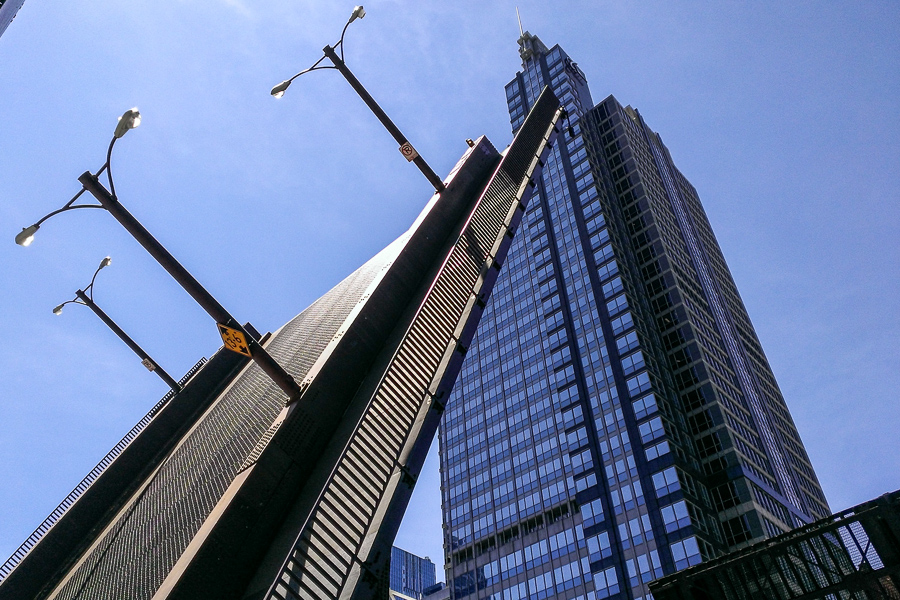
What's the ugliest thing you can do to a downtown city? Cut down all the buildings and put up a parking lot:
This seems kind of obvious, doesn't it? But then again, about 800 years ago someone cut down the last tree on Easter Island, so it's hard to underestimate the ability of people to make good decisions about land use.
I may come back to these again:
Publishing the Inner Drive Extensible Architecture™ to NuGet is still coming up...just not this weekend.
I almost forgot, even though Illinois Climatologist Jim Angel blogged it earlier today. The new NCA is here. Highlights—with a distinctly Illinois-centered view—via Angel:
- In the next few decades, longer growing seasons and rising carbon dioxide levels will increase yields of some crops, though those benefits will be progressively offset by extreme weather events. Though adaptation options can reduce some of the detrimental effects, in the long term, the combined stresses associated with climate change are expected to decrease agricultural productivity.
- Increased heat wave intensity and frequency, increased humidity, degraded air quality, and reduced water quality will increase public health risks.
- Climate change will exacerbate a range of risks to the Great Lakes, including changes in the range and distribution of certain fish species, increased invasive species and harmful blooms of algae, and declining beach health. Ice cover declines will lengthen the commercial navigation season [this winter was the exception to the rule - Jim].
If you don't mind using 170 megabytes of bandwidth, you can download the whole thing (or just the parts you want).
I debated this question with someone at a dinner a couple weeks ago. She suggested higher megapixel numbers told you more about the ego of the camera buyer than about the quality of the images.
I said it depends on how you're using the photos, but generally, more data yields more useful photos.
Here's an illustration, using a vaguely-recognizable landmark that I happened to pass earlier this weekend, and just happened to have photographed with three different cameras. All three photos are from approximately the same location at approximately the same time of day. Obviously there are some differences, but the illustration should work regardless.
Let's take a look at three images stored as 600x900 JPEGs and displayed at 500x750, the standard size for this blog. First, let's see one from a Kodak DC4800 in February 2001, 13 years ago. The original size was 1440x2160 at 3MP:
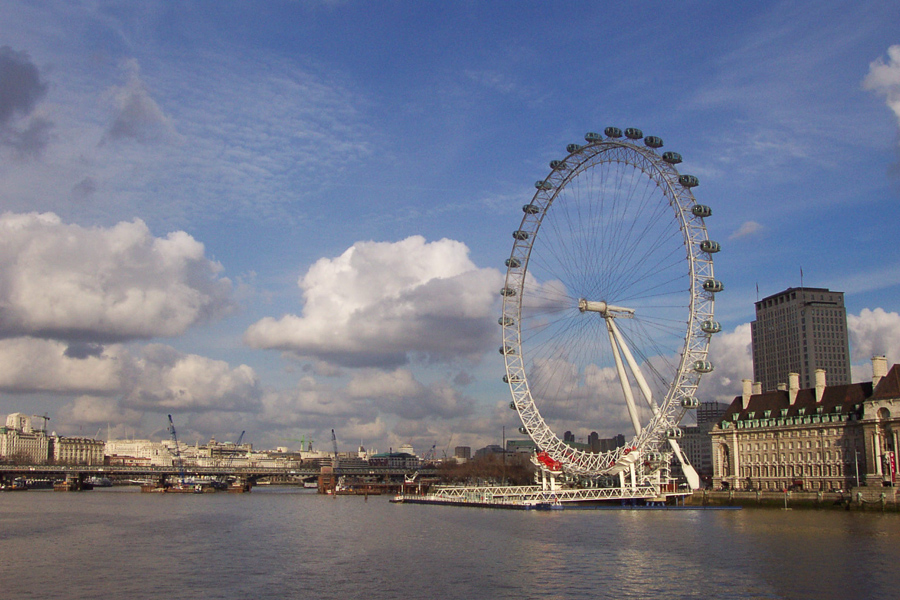
Now skip forward to August 2009, using a Canon 20D shooting a 2336x3648 JPEG at 8 MP:
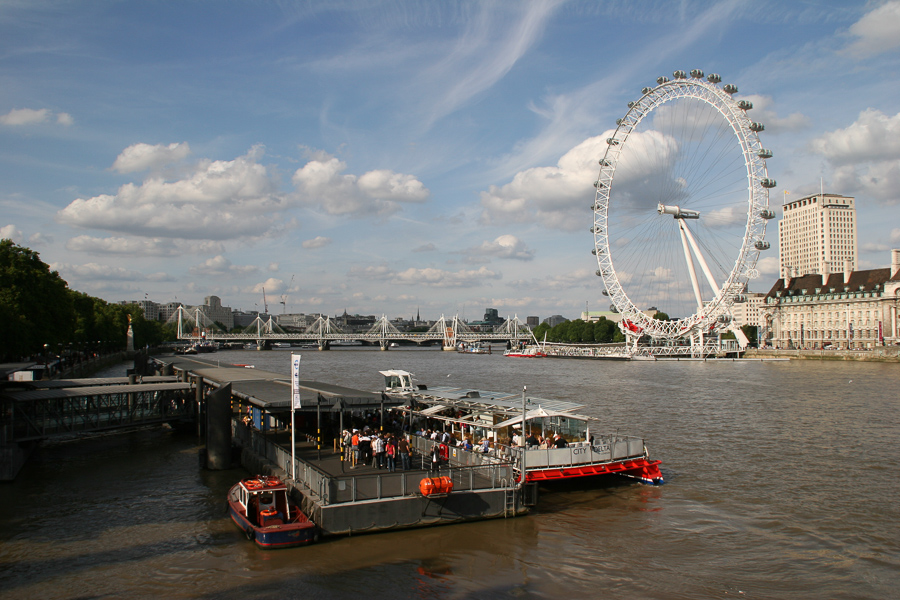
Finally, two days ago, using a Canon 7D shooting raw at 3456x5184 (18 MP):
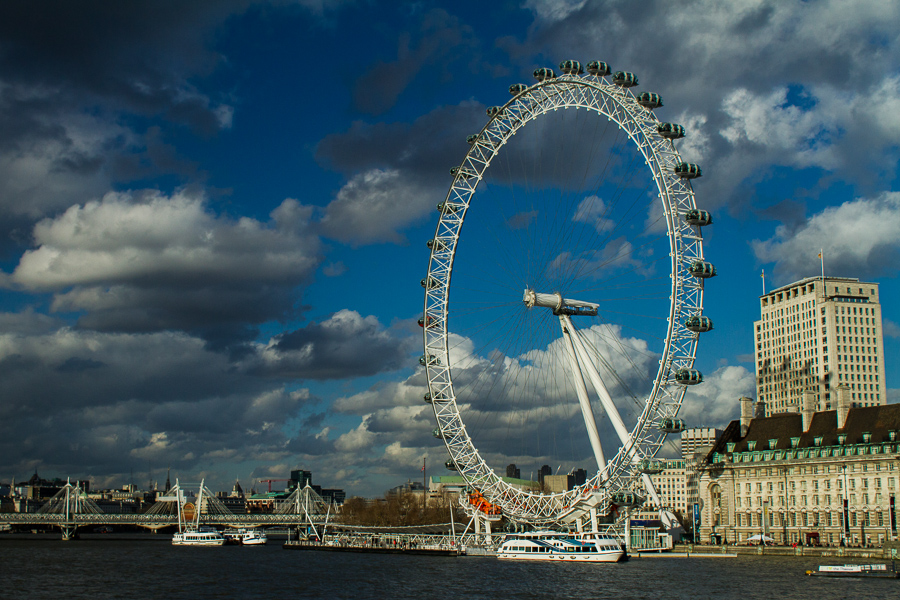
The photos look pretty comparable at this resolution, don't they? So let's zoom in on a 150x150 pixel view of each:
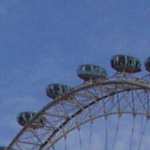
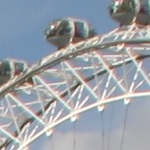
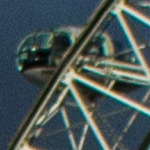
So each one has successively more data than the previous, which becomes obvious when you zoom in.
Another difference: I shot the one from this weekend using the raw format, which preserves all of the information the camera had available at the time of the photo. JPEG images are lossy; they always leave some information out. And because raw images are easier to manipulate using software, I was able to make the third photo a little bit better than I could make the other two.
So are more megapixels more useful? Not if you're just putting up blog posts, but for serious photography, absolutely.
 I'm David Braverman, this is my blog, and Parker is my 7½-year-old mutt. I last updated this About... page in September 2011, more than 1,300 posts back, so it's time for a refresh.
I'm David Braverman, this is my blog, and Parker is my 7½-year-old mutt. I last updated this About... page in September 2011, more than 1,300 posts back, so it's time for a refresh.
The Daily Parker is about:
- Parker, my dog, whom I adopted on 1 September 2006.
- Politics. I'm a moderate-lefty by international standards, which makes me a radical left-winger in today's United States.
- The weather. I've operated a weather website for more than 13 years. That site deals with raw data and objective observations. Many weather posts also touch politics, given the political implications of addressing climate change, though happily we no longer have to do so under a president beholden to the oil industry.
- Chicago (the greatest city in North America), and sometimes London, San Francisco, and the rest of the world.
- Photography. I took tens of thousands of photos as a kid, then drifted away from making art until early 2011 when I finally got the first digital camera I've ever had whose photos were as good as film. That got me reading more, practicing more, and throwing more photos on the blog. In my initial burst of enthusiasm I posted a photo every day. I've pulled back from that a bit—it takes about 30 minutes to prep and post one of those puppies—but I'm still shooting and still learning.
I also write a lot of software, and will occasionally post about technology as well. I work for 10th Magnitude, a startup software consultancy in Chicago, I've got more than 20 years experience writing the stuff, and I continue to own a micro-sized software company. (I have an online resume, if you're curious.) I see a lot of code, and since I often get called in to projects in crisis, I see a lot of bad code, some of which may appear here.
I strive to write about these and other things with fluency and concision. "Fast, good, cheap: pick two" applies to writing as much as to any other creative process (cf: software). I hope to find an appropriate balance between the three, as streams of consciousness and literacy have always struggled against each other since the first blog twenty years ago.
If you like what you see here, you'll probably also like Andrew Sullivan, James Fallows, Josh Marshall, and Bruce Schneier. Even if you don't like my politics, you probably agree that everyone ought to read Strunk and White, and you probably have an opinion about the Oxford comma—punctuation de rigeur in my opinion.
Thanks for reading, and I hope you continue to enjoy The Daily Parker.
The Great Lakes have more ice cover than at any point in the last 20 years. Here's the view on the flight in last Monday morning:
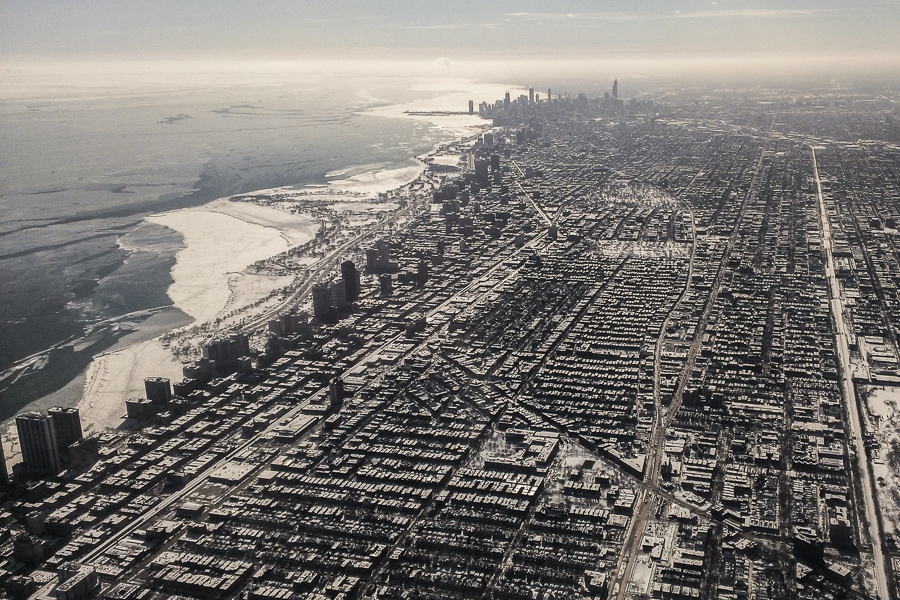
If you don't mind a 150 MB download, NASA took a photo of the Great Lakes (and, incidentially, me) at almost that exact moment. The ice today (also 150 MB) looks about the same.
I got gas today, which isn't that interesting in itself, except that it's only the third time I've gotten gas in the past four months. Like the last time, I decided to fill up in case it got cold (a full tank is better for your car in winter), so really I've only gotten about 2½ tanks of gas since the beginning of November.
It's perfectly valid to wonder why I even own a car. I didn't for most of the time I lived in New York. Still, today I had about a half-dozen errands to run, and having a car made a huge difference, especially to Parker. If I only used Zipcar, for example, I wouldn't be able to bring him around either.
Still, this is why I like living in a big city.
When I last visited St. Martin five years ago, I struggled a bit to get through the heavily-defended border between the French and Dutch sides. I am happy to report that the two countries have made significant improvements to the border since then. For starters, they've put up a brand-new sign:
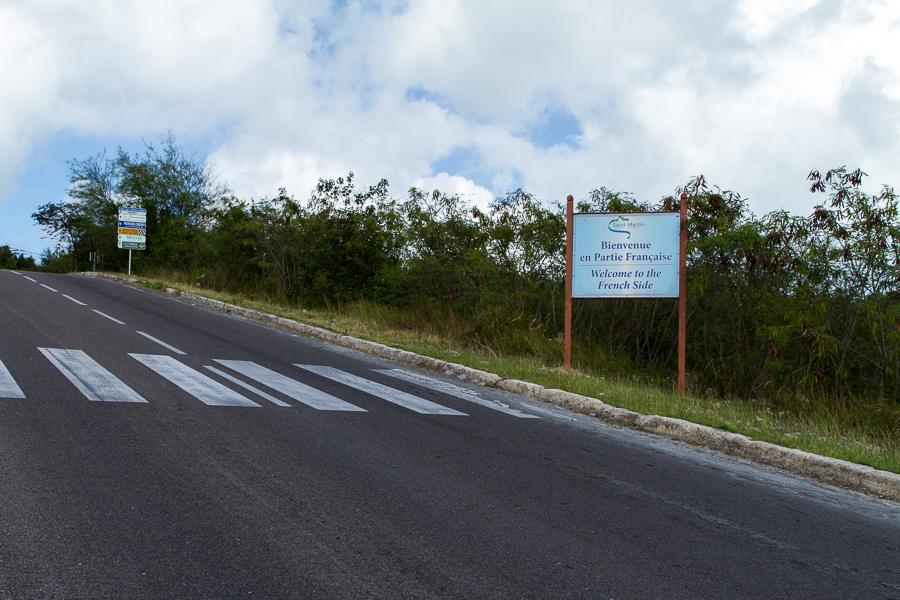
Unfortunately, it appears that an aggressor nation has taken over part of the French side:
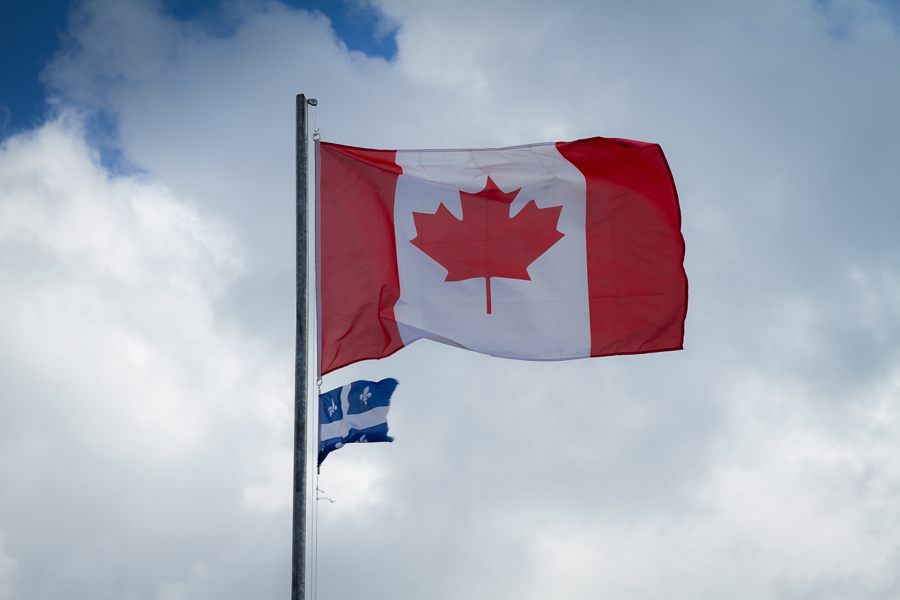
All right, I'm wasting time writing a blog post when I could do it with something else. If only this Internet connection were faster, I could be offline a lot faster.